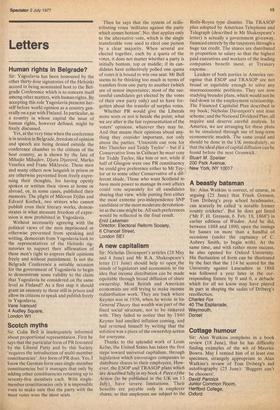Letters
Human rights in Belgrade?
Sir: Yugoslavia has been honoured by the other thirty-four signatories of the Helsinki accord in being nominated host to the Bel- grade Conference which is to concern itself among other matters, with human rights. By accepting this role Yugoslavia presents her- self before world opinion as a country gen- erally on a par with Finland. In particular, as a country in whose capital the issue of human rights, however defined, might be freely discussed.
Yet, at the very time when the conference is in session in Belgrade, freedom of opinion and speech are being denied outside the conference chamber to the citizens of the host country, as is shown by the fate of Mihajlo Mihajlov, Djura Djurovi6, Marko Veselica and Franc Miklavcic. These men and many others now languish in prison or are otherwise prevented from freely expre- ssing their thoughts, for having openly spoken or written their views at home or abroad, or, in some cases, published their memoirs. The plight of Milovan Djilas and Edvard Kocbek, two writers who cannot publish even their literary works, demon- strates in what measure freedom of expre- ssion is now prohibited in Yugoslavia.
Without necessarily agreeing with the political views of the men imprisoned or otherwise prevented from speaking and writing, democrats from Yugoslavia look to the representatives of the Helsinki sig- natories to support their affirmation of these men's right to express their opinions freely and without punishment. Is not the Belgrade Conference a suitable occasion for the government of Yugoslavia to begin to demonstrate some validity to the claim that Yugoslavia be considered on the same level as Finland? As a first step it should grant an amnesty to those still in prison and allow its citizens to speak and publish freely in Yugoslavia.
Vane ivanovio 4 Audley Square, London W1


































 Previous page
Previous page